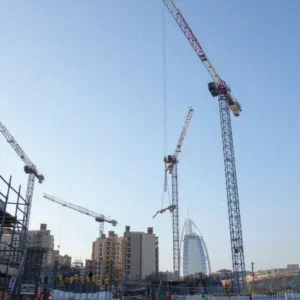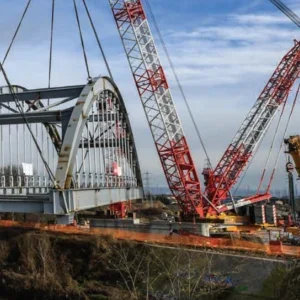Evans came to Wolffkran bringing many years experience from Terex Demag in the UK. He says, “Wolffkran Arabia came into being in early 2007. I joined Wolffkran from Terex on 1 May 2007. I spent a couple of months induction at the Wolffkran factory, before coming out to the Emirates. We made our first sales in the autumn of 2007.
“Wolffkran has sold cranes in the region before setting up Wolffkran Arabian, supplying them to Kuwait, Bahrain and the UAE. Wolffkran Arabia was set up to provide a regional base, and a fuller service to customers. The problem many contractors face is that once they’ve bought a crane from a dealer, who doesn’t have an office here, it’s not clear where they need to go to get support. We aim to fix that.
“Wolffkran Arabia is a joint venture between Wolffkran (49%) and Kanoo (51%). It’s managed as a separate business, but it has representatives from both owners on the board. Kanoo Group have been in business for more than a hundred years, and Kanoo Machinery was set up in the 1960s. As well as Wolffkran, they have joint ventures with Grove, mobile hire firm Johnson Arabia, Hitachi and Bobcat. Construction is an industry they’re familiar with. You need a local sponsor to do business in the UAE, and some sponsors are just a name. Kanoo have far more involvement than that. Their presence throughout the GCC has been a real benefit to us.
“Wolffkran Arabia was registered in Abu Dhabi, with a second office in Dubai. As well as the UAE we have rented cranes working in Oman, Qatar, Kuwait and Bahrain. In Saudi, it’s mainly sales, but we also have some cranes on hire.
“What we wanted to do was not just to offer sales and rental, but also a full consultancy service. We’re not just providing lift plans, but a complete solution. A customer can come to us with a plan of the site, and details of what they expect their heaviest lifts to be. We’ll help them choose the right cranes, and where they will need to be placed on the site. We’re here to provide that support: we’ll even do that for customers who’ve bought cranes from us before, and want our help planning how to use them on a new job. It’s a lot easier to get customers to come back, than it is to find new customers.
“We have three yards in the UAE for crane storage, and we keep spare parts here. We have erecting crews headed by European riggers with years of experience, from working here and in Europe. They’re all factory trained, when they start working with us. We‘ve also got Muslim rigging supervisors and crew, who are able to work in Mecca, with the same level of training. Our operations manager has 25 years of experience, five of them in the Middle East. We’ve got our own electrical engineers and electronics experts. Our Filipino and other overseas workers all undergo induction at the factory in Germany.
“We can provide customers with experienced operators, both for sales and leases. All of our operators have at least three years experience, and receive induction training at the factory in Germany. If customers who have bought one of our cranes want to use their own operators, we can offer induction on the crane. We’ll only do that for experienced operators, we don’t train new operators. If we feel an operator doesn’t understand us, or isn’t properly trained, we’ll let the customer know and won’t sign them off to operate the crane. There’s no way we want operators using our cranes who don’t know what they’re doing. They could damage the crane, and damage the customer’s business. As well as operators, we can provide slinger signallers, who are all experienced.
“Our entire rental fleet is fitted with SIM cards for tele-service. That means our engineers can log in to the crane from the office, check its performance, and diagnose any potential problems before the customer is aware of them. That cuts downtime for the customer, and cuts wastage of parts and labour. Our engineers don’t need to go to a site, perform an inspection, and then go back to get the right parts. More than 75% of the time, they will know what the problem is before they arrive, and can bring the right parts with them. Often, when a crane is due for scheduled maintenance, we can preventatively replace any parts that need it.
“The tele-service system means we can also provide the customer with analysis of the work the crane has been doing. They can see the crane’s utilisation, and that can help when we plan their next job. So far, all the cranes we’ve sold have been ready to be used with tele-service. It’s up to the customer to decide whether to install the SIM card. If they do, then we can go ahead and provide the service.
“Across the GCC, there’s still a lot of growth happening. In Dubai, some projects have been cancelled, but in Saudi Arabia, Abu Dhabi, and Qatar, business is still strong. The question is which countries have the oil revenue. Where they do, construction is still moving forward. In Abu Dhabi, there are currently $209bn worth of projects under way. Where they don’t, in places like Dubai, there’s more of a problem. If you want to do business here, it’s important not to look at just one city or emirate, but at the region as a whole.”






